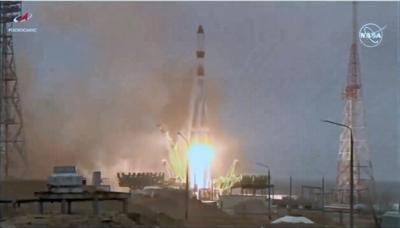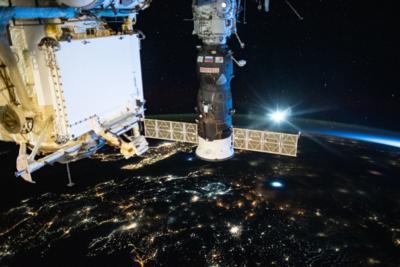Wed, Feb 17, 2021
The Progress 77 Will Later Detach Pirs From The Station
Russia’s Progress 77 cargo rocket launched from its launch pad at the Baikonur Cosmodrome in Kazakhstan on Feb 14., 2021.

An uncrewed Russian Progress 77 carrying just over one ton of nitrogen, water and propellant to the International Space Station launched from the Baikonur Cosmodrome in Kazakhstan at 11:45 p.m. EST (9:45 a.m. Monday, Feb. 15, Baikonur time).
The resupply ship reached preliminary orbit and deployed its solar arrays and navigational antennas as planned for a two-day rendezvous on its way to meet up with the orbiting laboratory and its Expedition 64 crew members. After making 33 orbits of Earth on its journey, the spacecraft will automatically dock to the station’s Pirs docking compartment on the Russian segment at 1:20 a.m. Wednesday, Feb. 17.
The Progress 77 will later detach Pirs from the station readying the Zvezda service module’s port for a new module. Pirs will then be replaced with the Nauka multipurpose laboratory module to be delivered on a Proton rocket. The Pirs undocking occurs a few days after Nauka’s launch to enable Russian flight controllers to confirm a good vehicle in orbit heading to the station.
In the meantime, science is the main mission aboard the station. Microgravity research has the potential to reveal new insights and potential therapies that otherwise wouldn’t be possible on Earth due to gravity’s interference.

NASA Flight Engineers Michael Hopkins and Victor Glover partnered up on Friday for a pair of different experiments. The duo demonstrated how hydroponics may support space agriculture then explored how the human nervous system adapts to weightlessness.
Astronauts Kate Rubins of NASA and Soichi Noguchi of JAXA joined each other for maintenance work inside the Tranquility module. Rubins also collected microbe samples to understand how they survive and adapt on the station. NASA Flight Engineer Shannon Walker spent the day working on batteries that keep life support systems powered inside U.S. spacesuits.
Cosmonauts Sergey Ryzhikov and Sergey Kud-Sverchkov continued studying how the lack of gravity impacts the effectiveness of a workout. Ryzhikov also checked seating inside the Soyuz MS-17 crew ship as Kud-Sverchkov worked on ventilation and radiation hardware.
More News
Cooperative Surveillance Any surveillance system, such as secondary surveillance radar (SSR), wide-area multilateration (WAM), or ADS-B, that is dependent upon the presence of cert>[...]
Aero Linx: OX5 Aviation Pioneers Incorporated in 1955 as a Pa 501 (c)(3) Not for Profit Corporation, the OX5 Aviation Pioneers is dedicated to bringing before the public the accomp>[...]
The Pilot Appeared To Regain Control After Six Rotations And Attempted To “Fly Out” Inverted But Had Insufficient Altitude On November 8, 2025, at 1038 eastern standard>[...]
From 2018 (YouTube Edition): Aero-News Talks With The Airplane's Builder One of the many unique airplanes at AirVenture 2018 was a 1/3-scale B-17 bomber built by Jack Bally, who ta>[...]
Aero Linx: Society of U.S. Army Flight Surgeons (SoUSAFS) The Society of US Army Flight Surgeons (SoUSAFS) serves to advance the science and art of Aerospace Medicine and its allie>[...]
 ANN's Daily Aero-Term (12.04.25): Cooperative Surveillance
ANN's Daily Aero-Term (12.04.25): Cooperative Surveillance ANN's Daily Aero-Linx (12.04.25)
ANN's Daily Aero-Linx (12.04.25) NTSB Prelim: Extra Flugzeugproduktions EA 300/SC
NTSB Prelim: Extra Flugzeugproduktions EA 300/SC Classic Aero-TV: The Bally Bomber - The All Time Ultimate Warbird Replica?
Classic Aero-TV: The Bally Bomber - The All Time Ultimate Warbird Replica? ANN's Daily Aero-Linx (12.05.25)
ANN's Daily Aero-Linx (12.05.25)




